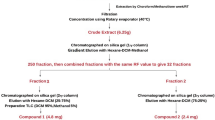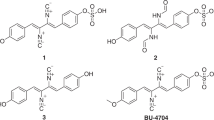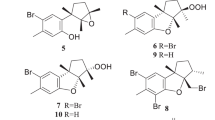Abstract
THE evaluation of marine plants and animals for potential use in chemotherapy poses problems of procurement of materials and of techniques of screening for significant drug activity1. We have been studying antimicrobial activity in marine sponges both from the viewpoint of marine ecology and in an effort to develop new drugs, and report on our methods and some of the results obtained with collections from the Caribbean Sea, Mediterranean Sea and the Pacific Ocean.
This is a preview of subscription content, access via your institution
Access options
Subscribe to this journal
Receive 51 print issues and online access
$199.00 per year
only $3.90 per issue
Buy this article
- Purchase on Springer Link
- Instant access to full article PDF
Prices may be subject to local taxes which are calculated during checkout
Similar content being viewed by others
References
Marderosian, A. der, J. Ocean. Tech., 19 (Marine Technology Society, Washington, DC, 1968).
Pfister, R. M., and Burkholder, P. R., J. Bact., 90, 863 (1965).
Sharma, G. M., Vig, B., and Burkholder, P. R., J. Ocean. Tech., 119 (Marine Technology Society, Washington DC, 1968).
Author information
Authors and Affiliations
Rights and permissions
About this article
Cite this article
BURKHOLDER, P., RUETZLER, K. Antimicrobial Activity of some Marine Sponges. Nature 222, 983–984 (1969). https://doi.org/10.1038/222983a0
Received:
Revised:
Issue Date:
DOI: https://doi.org/10.1038/222983a0
This article is cited by
-
Antifouling Properties of Bacteria Associated with Marine Oyster Crassostrea Sp.
Thalassas: An International Journal of Marine Sciences (2018)
-
Antifouling Activities of Antagonistic Marine Bacterium Pseudomonas putida Associated with an Octopus
Proceedings of the National Academy of Sciences, India Section B: Biological Sciences (2017)
-
Antibacterial products of marine organisms
Applied Microbiology and Biotechnology (2015)
-
Antimicrobial activity of Red Sea corals
Marine Biology (2006)
-
Consistent Bacterial Community Structure Associated with the Surface of the Sponge Mycale adhaerens Bowerbank
Microbial Ecology (2006)
Comments
By submitting a comment you agree to abide by our Terms and Community Guidelines. If you find something abusive or that does not comply with our terms or guidelines please flag it as inappropriate.



